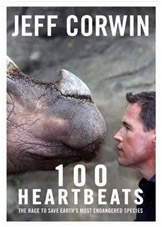While filming his new documentary, 100 Heartbeats, Jeff Corwin cut off the horn of a black rhino to protect it from poachers, broke four ribs transporting Sumatran orangutans to a wildlife sanctuary, and helped raid a Cambodian restaurant serving endangered species like pangolin and soft-shelled turtle.
“I wanted to tell these stories in a way that hadn’t been done before,” Corwin said at a screening of the film in New York on Tuesday. “I wanted to be in the maelstrom.”

The two-hour documentary, which premieres Sunday night, is the second installment in MSNBC’s Future Earth series and Corwin’s first collaboration with the network. Corwin, who rose to fame hosting shows on Animal Planet, is no stranger to close encounters with creatures large and small, but 100 Heartbeats is a new direction for him and MSNBC.
His work for Animal Planet, while engaging, leans more toward entertainment than hard-hitting journalism. By comparison, 100 Heartbeats is a forceful plea for humanity to stop the so-called “Sixth Extinction,” a rapid rise in the rate of extinction due almost entirely to human activity.
“I wanted to step out of that cookie-cutter niche as the animal guy, and the network gave me a chance to do that,” said Corwin, who holds bachelor’s degrees in biology and anthropology, and a master’s degree in wildlife conservation and management. “I was trained as a scientist and had to learn to become a journalist.”
The planet has undergone five mass extinction events, the last of which killed off the dinosaurs 65 million years ago. These were all natural occurrences, however. According to The International Union for the Conservation of Nature, the current rate of extinction (pdf) is about 1,000 to 10,000 times higher than it used to be due to habitat loss, over-exploitation (hunting, fishing, etc.), pollution, and global climate change. In the last 500 years, the union says, human activity has forced 869 species into extinction and now threatens 16,928 more.
When Corwin pitched 100 Heartbeats (as in 100 heartbeats away from extinction) to MSNBC, the idea “scared us,” said Michael Rubin, the network’s vice president for long-form programming, at the screening. “It seemed too big, too ambitious, but we were intrigued by the storyteller as well as the story.”
That paid off for Corwin. Two years ago, he undertook a similar project with CNN called Planet in Peril, working alongside Anderson Cooper and Sanjay Gupta. Like 100 Heartbeats, the four-hour documentary, which aired in October 2007, amounted to serious journalism. But Corwin felt like he didn’t have much creative control over the project and walked away with “mixed feelings” about his first “media rodeo.” Although Planet in Peril focused in part on endangered species, Corwin wanted to record their plight in a more “intimate” fashion, and said MSNBC allowed him to do that.
“I’ve never felt like a full partner in these projects,” he said, “but they gave me carte blanche to travel the world for almost a year to experiment with these stories. It’s not a type of programming that MSNBC is used to doing.”
Although viewers who follow environmental and endangered species news closely won’t find much new information in 100 Heartbeats, it is nonetheless a powerful exposé that is sure to wrench a few hearts. From cheetahs in Namibia and hawksbill turtles in Indonesia to Panamanian golden frogs and California condors, Corwin delivers detailed and fascinating accounts of the efforts to save some the planet’s most imperiled creatures.
“I loved it,” said Phil Griffin, MSNBC’s president, after the screening. “With this type of programming, we stand for something by drawing attention to important issues.”
The network launched its Future Earth series in April with a documentary about the melting of polar ice due to climate change. 100 Heartbeats is the second installment. A third, called 2025, about fresh-water shortages around the world, will air in December; a fourth, about the global energy crisis, will be released on Earth Day 2010.
Corwin’s documentary, which cost about $2 million to produce, spawned from a book, also called 100 Heartbeats, which was released in late October and was about two-thirds complete when he pitched MSNBC. The filming was often arduous, Corwin said, but “the hardest part was looking at all the footage that didn’t make it in.”
Fortunately, some of that extra tape found a home on the Future Earth Web site. There, for example, viewers can watch the story of Chhouk, a Cambodian elephant that lost the lower half of one of its legs in poacher’s snare, but received a prosthetic from local conservationists that may have saved its life.
Not all tales have happy endings, however. Corwin said that since he completed filming, timber companies have purchased the jungle sanctuary to which he’d helped transfer a group of Sumatran orangutans. “Unfortunately,” he said, “these types of stories are not going away.”
The film and the book repeatedly stress that humans are responsible for the extinction crisis, and only they have the power to stop it. Clearly, the last thing Corwin wants is for his next documentary to be called 50 Heartbeats.
Curtis Brainard writes on science and environment reporting. Follow him on Twitter @cbrainard.
